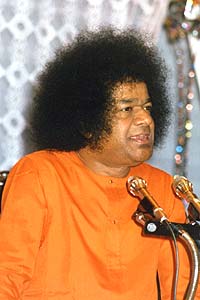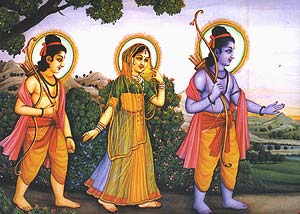 |
 |
 |
Volume
6 - Issue 04
APRIL - 2008 |
Why Did The Divine Descend as Rama
All objects in the world are liable to change. All living beings must pass some day. But ideals and sacred objectives established in human hearts shine forever. If one has to live up to an ideal, he/she must be prepared to face many ordeals, difficulties, calumnies, trials and tribulations. These ideals have continued up to the present day to glow in the hearts of the people, because they have been upheld in spite of vicissitudes and ordeals. Aeons may come and go, continents may appear and disappear, people may pass away, but ideals and values remain a perennial source of inspiration to the world…. Common people can derive no benefit if the Formless Absolute remains in Kailasa or Vaikunta. It is not possible to worship the Formless Absolute. Hence, the Rama-Avatar appeared in human form to enable humanity to experience the Formless in a form which is accessible and helpful to them…. Unfortunately, even when the Formless Absolute assumes a form, there are persons, who impelled by their own attitudes, attribute their own human foibles to the Avatar. "When He has the same Form as ours, the same physical features, and eats, talks and moves about like any of us, what is the difference between the Avatar and ourselves?" they ask. Because of this narrow-minded approach, these persons distance themselves from the Divine. An effort must be made to understand the nature of Divinity. "Daivam maanusharoopena (God in Human Form)" declares the scripture.... Why and How Avatars Work The descent of the Avatar means the Divine coming down to the level of the human. No blemish attaches to the Divine as a result of this descent. There is no diminution in His puissance. Here is the example of a child playing on the ground. If the mother feels it is beneath her dignity to bend, and calls upon the child to leap into her arms, the child cannot do so. But out of her love for the child, the mother herself stoops and picks up the baby. By bending down to take the child, does the mother bow to the child? Likewise, the Avatar descends to the level of the human to bless and rescue those who cannot rise to the level of the Divine. The ignorant assumes that because the Divine has descended with a human form, God has lowered Himself to the human level. This is a case of bending and not kneeling down. It is an act of benediction and not of submission… Similarly, the Avatar does not forgo any of His supreme powers merely because He lives and moves among human beings as a man. Narrow-minded persons view these things differently.
This phenomenon could be noticed in several instances in the case of the Rama-Avatar. In the Ramayana, Rama is depicted as one who, like other ordinary human beings, experienced the pangs of separation from Sita. Why did Rama exhibit such feelings? It is to serve as an example to the common people how individuals should behave in similar circumstances. The Ramayana is a work which holds out ideals for every home and every family. What should be the relations between a father and a son, how should a husband and wife conduct themselves, how should brothers behave towards each other, what should be the relations between the rulers and the citizens, how should sisters-in-law conduct themselves - all these are exemplified in the story of the Rama-Avatar. Sri Rama – An Ideal for Every Man Rama was prepared to honour a boon given by His father to His step-mother in fulfillment of an old promise. He renounced the throne at the moment of coronation and elected to go to the forest as an exile. Eminently qualified as He was to become the ruler, nevertheless He chose to go to the forest to honour His father's plighted word. This is a glorious example of an ideal life. Today people would set at nought promises given by the father and place their self-interest in the forefront… Rama was prepared to face any ordeals and troubles in upholding this sacred principle. Rama was ever active in fulfilling the wishes and responding to the opinions of the people. Highly sensitive even to the remarks of a petty washerman, Rama sent away Sita to the forest out of a feeling that the washer-man's comment might be an indication of the unspoken feelings of many others among his subjects. Rama stands out as an ideal ruler intensely responsive to the wishes of the people…Rama demonstrated the ideal relations that should exist between the ruler and the ruled. Lakshmana's Unflinching Devotion
Turning to the harmonious relations that existed between the brothers', complying with his stepmother's words, Rama might don the bark of trees, wear the mantle of an ascetic and leave for the forest, there was no such obligation on Lakshmana's part. But as a younger brother, he felt that it was not proper for him to stay and enjoy life in Ayodhya, when his brother was leaving for the forest. He was ready to renounce his mother and wife and accompany Rama, whom he considered as his life-breath... The behaviour of brothers today in similar situations would be entirely different. They are likely to indulge in litigation over the sharing of property, and lose them all in carrying the dispute up to the Supreme Court…To such brothers, Rama should serve as an example… The Lesson from Ramayana The foremost lesson to be learnt from the Rama-story is how to foster unity and harmony in a family...The reign of Rama was marked by concern for justice and morality. Today the people are bedeviled by distrust and suspicion at every step. "Why should God do this?" Such questions are asked out of narrow-minded doubts. There will be no room for such doubts if the Infinite Nature of the Divine is properly understood. The petty-minded folk who cannot grasp the Omni-competence of the Divine raise such questions. Their entire life is wasted in this manner. Hence, people should get rid of such pettiness… Strengthen Your Faith to Acquire Bliss If the Name of the Lord is not recited in the proper spirit, of what use is all spiritual practice? Faith is the primary requisite. Chanting the Name endlessly, without faith, is utterly useless. Where there is faith, there is Love. Where there is Love, there is Peace. Where there is Peace, there is Truth. Where there is Truth, there is Bliss. Where there is Bliss, there is God. If faith is lacking how can Bliss be experienced? Therefore, strengthen your faith... Develop faith in the ideals of Rama. Rama does not mean the son of Dasharatha. The Atma (Self) is Rama, and hence Rama is referred to as Atma-Rama… Everyone must aim at becoming an ideal person... Ideals, not ostentation, should be the watchword. Develop faith in the Self, and lead a Godly life. To read the complete discourse, click here. - Divine Discourse, Rama Navami Day, 1991. |
Vol 6 Issue 04 - APRIL 2008
|
Best viewed in Internet Explorer - 1024 x 768 resolution. |



